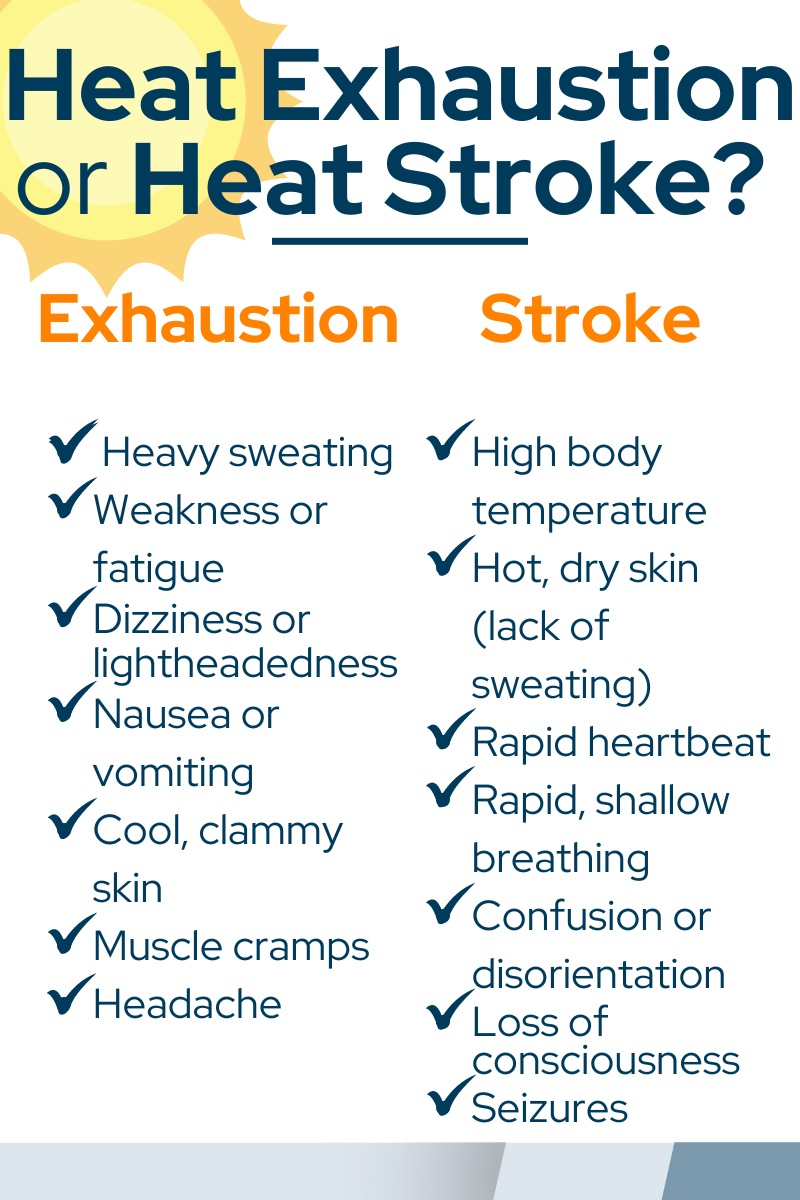July 1, 2024
Heat Exhaustion vs. Heat Stroke: What to Do & When to Get Help
By: Dr. Valerie Danielson, Elliot Family Medicine at Bedford
As temperatures rise, it's important to understand the differences between heat exhaustion and heat stroke. Both are serious conditions resulting from exposure to high temperatures and can lead to severe complications if not addressed quickly. In this article, we'll discuss the differences between heat exhaustion and heat stroke, their dangers, treatment options, and ways to stay safe during hot weather.
What is heat exhaustion?
Heat exhaustion is a heat-related illness. Symptoms include excessive sweating, dehydration, and a rapid pulse. It typically occurs when the body loses fluids and electrolytes through sweating, leading to an imbalance that affects normal bodily functions. Symptoms of heat exhaustion may include:
- Heavy sweating
- Weakness or fatigue
- Dizziness or lightheadedness
- Nausea or vomiting
- Cool, clammy skin
- Muscle cramps
- Headache
If left untreated, heat exhaustion can progress to heat stroke.
What is heat stroke?
Heat stroke is a severe heat-related condition that happens when the body stops regulating its temperature, resulting in a dangerous increase in body temperature. Unlike heat exhaustion, heat stroke is a medical emergency that requires immediate treatment. Symptoms of heat stroke may include:
- High body temperature (above 103°F or 40°C)
- Hot, dry skin (lack of sweating)
- Rapid heartbeat
- Rapid, shallow breathing
- Confusion or disorientation
- Loss of consciousness
- Seizures
 Why are heat exhaustion and heat stroke dangerous?
Why are heat exhaustion and heat stroke dangerous?
Both heat exhaustion and heat stroke are dangerous and can result in organ damage, brain injury, and even death if not treated promptly. Certain people are more vulnerable to heat-related illnesses, including the elderly, children, individuals with chronic medical conditions, and those engaging in strenuous outdoor activities.
What are the treatments for heat exhaustion and heat stroke?
If you think someone is experiencing heat exhaustion, it's important to act quickly to prevent it from becoming heat stroke. Here's what you can do:
- Move the person to a cool, shaded area.
- Encourage them to rest and drink cool water or sports drinks to rehydrate.
- Apply cool compresses or use a fan to help lower body temperature.
- Loosen tight clothing and assist with removing unnecessary layers.
If symptoms continue or worsen, seek medical attention right away.
Heat stroke requires immediate medical attention. Take the following steps:
- Call emergency services immediately.
- Move the person to a cooler environment.
- Remove excess clothing and apply cool water or ice packs to help lower body temperature.
- Monitor their breathing and consciousness while waiting for medical assistance.
How do you prevent heat exhaustion and heat stroke?
Preventing heat-related illnesses is key to staying safe in hot weather. Here are some tips to help you avoid heat exhaustion and heat stroke:
- Stay hydrated by drinking plenty of fluids, especially water, throughout the day.
- Limit outdoor activities during the hottest parts of the day.
- Wear lightweight, loose-fitting clothing and a wide-brimmed hat when outdoors.
- Take regular breaks in shaded or air-conditioned areas.
- Avoid strenuous activities in extreme heat, and if unavoidable, take frequent breaks.
- Check on vulnerable people, such as the elderly or those with chronic illnesses, during heatwaves.
By staying informed about the signs, symptoms, and preventive measures for heat exhaustion and heat stroke, you can enjoy the summer safely and avoid potentially life-threatening situations. Remember, when it comes to heat-related illnesses, prevention is always better than cure. Stay cool, stay hydrated, and stay safe!
 Valerie J Danielson, MD, FAAFP, DABOM is a family medicine practitioner at Elliot Family Medicine at Bedford.
Valerie J Danielson, MD, FAAFP, DABOM is a family medicine practitioner at Elliot Family Medicine at Bedford.
